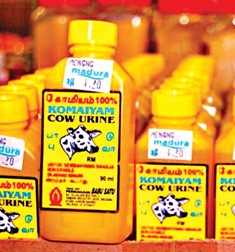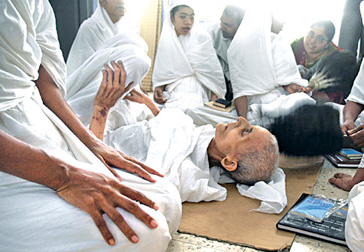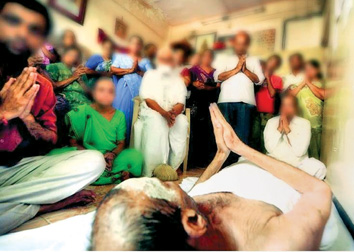|

Beauty products made with cow dung launched
 You may be a little reluctant to use these beauty products but
according to ancient Ayurvedic practices cow dung and cow urine [gava
mutra] are considered as miracle medicines used in India. You may be a little reluctant to use these beauty products but
according to ancient Ayurvedic practices cow dung and cow urine [gava
mutra] are considered as miracle medicines used in India.
The Visha Hindu Parishad (VHP), a right-wing non-governmental
organisation in India, has recently launched a line of beauty products
containing two very special ingredients - cow dung and cow urine.
“Ayurveda talks about use of cow dung to prevent pimples. But people
are reluctant to use dung, which is why we are making beauty products
out of it,” VHP leader Venkatesh Abdeo said.
The VHP beauty products include a beauty soap made with gava mutra,
aloe vera and almond oil, a shower gel made with cow dung ash and a
moisturizing cream containing beeswax and distilled cow poo, among
others. Abdeo assures that these products are pure, natural and better
than anything else available on the market right now. But, best of all,
he adds that “people do not need to worry about the smell because we
have removed most of that as part of the production process”. Cow dung
and gava mutra are set to revolutionise the skincare industry, the VHP
believes, and it has urged people to invest in the new beauty products,
to boost the popularity of these ancient ingredients.
His job is to safekeep students’ mobile phones
 What a job it is! He makes a living by safe keeping students’ mobile
phones. What a job it is! He makes a living by safe keeping students’ mobile
phones.
When New Yorker Jhonn de La Puente realised that many high school
students aren’t allowed to bring their personal cell phones to school,
his innovative entrepreneur skills helped him to come out with a simple
but brilliant business model - a cell phone storage van.
The 42-year-old now runs a company called ‘Safe ‘n’ Secure Cellutions
LLC’ - it consists of a modified Ford E250 parked outside Brooklyn’s
Prospect Heights High School complex, which houses four different public
high schools. Right before they enter school, students queue up outside
the van to deposit their phones through a small mail-slot on the side.
They are handed colored tickets that they can use to retrieve the
phones as they leave school at the end of the day. The service costs
them anywhere between $3 and $5 per week.
His cell phone storage van was designed and customised by himself,
adding security cameras, storage racks and a cash lock box. “I even did
research on the average height of high school students to get a median
height to put this window at,” he revealed.
|

Jhonn de La Puente |
“It was really important to me that it was the right level so they
could see my face and so that I could interact with the customers.”
Along the van’s walls, he installed dozens of shoe organizers to
create a neatly organised phone storage system. The plastic pockets on
the organisers are large enough to hold smartphones, mp3 players and
flip phones - they can accommodate up to 100 devices per day.
Puente said that he spent about $4,000 on overall customisation, of
which $200 were spent on the organisers alone.
The van is extremely popular with high school kids, mainly because
most of them have to go through lengthy commutes to and from school -
often taking over 40 minutes. And thanks to Safe ‘n’ Secure, they get to
use their phones during this time, rather than leave the devices at
home.
“If a phone is missing, that means we gave it away - I would buy them
a new phone.” But, he insists that “that has never, ever happened.”
Fast to death in ancient Santhara ritual
Fast unto death is used as a religious ritual as well as to gain
something or to protest against an injustice. Most of the people who
indulge in this act as a means of protest go on for sometime and then
give up half way. But it is not so for followers of Jainism,one of the
oldest religions in the world.
 Santhara the ritual practiced by Jain devotees involves participants
making an oath to stop eating until they literally die of starvation. Santhara the ritual practiced by Jain devotees involves participants
making an oath to stop eating until they literally die of starvation.
According to the Jains, this is a reliable way to purge oneself of
bad karma and achieve Moksha - liberation from the worldly cycle of
death and reincarnation.
Every year, hundreds of Jains across India take up the onerous oath -
some are monks, others are ordinary people. The practice is more popular
with Jains who are ill or dying, but healthy people are also known to
participate.
When followers of Jainism feel that they have entered the final stage
of life, with no meaningful work left to complete, they may seek the
permission of their friends, family, and guru to take up the practice of
Santhara. Once approved, they are permitted to gradually give up food
and liquids. During this time, they must learn to give up all worldly
attachments and make peace with death. If they are unable to do this, it
implies that they have failed the vow and must give up the fast.
The longest that a Jain has managed to stay alive on the oath is 87
days - it was achieved by 60-year-old Rajasthani monk Sadhvi Charan in
2009.
 Since the followers of Santhara are publicly glorified, thousands of
Jains flocked to see Sadhvi in her last moments. Over 20,000 people
celebrated her passing from the whirlpool of life and death. Santhara is
such a significant event for the Jains that information about its
participants is published in local newspapers so that people can come to
witness the final hours of staunch believers. Since the followers of Santhara are publicly glorified, thousands of
Jains flocked to see Sadhvi in her last moments. Over 20,000 people
celebrated her passing from the whirlpool of life and death. Santhara is
such a significant event for the Jains that information about its
participants is published in local newspapers so that people can come to
witness the final hours of staunch believers.
The spectators are often dressed in white, or are sometimes even
nude, out of respect for the dying person. When they sense death
approaching, they begin to chant the names of their Gods. The death
itself is met with tears and muted mourning. The spiritual fast has
become embroiled in controversy in recent years.
Those against it equate it to suicide that elderly Jains are
compelled to commit. They call it a criminal offence and ask for it to
be banned. But the Jains argue that they have the right to religious
freedom according to India’s constitution.
They insist that the practice is normal and must be treated with
respect. It isn’t suicide, they say, because the people have the option
change their mind during the fast and continue living instead. |

